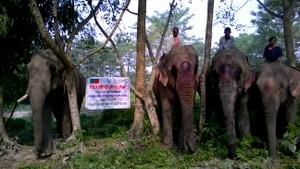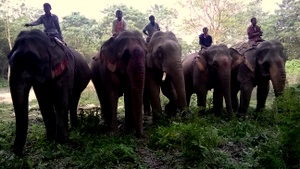Health Camp for Captive Elephants in Rongia
Rongia, Assam, November 23, 2014: WTI veterinarians organised a health camp for captive elephants in Dipila Khutara Mandir, Kuruwa range of North Kamrup Division, Rongia on 23rd November. Seven elephants were brought for health check up. All the elephants were de-wormed and provided with vitamin supplements. Three elephants were treated for abscess in various parts of the body and an elephant was also treated for kari.
Assam has roughly 1500 captive elephants of which nearly 200 are with the Forest Department and rest are privately owned. WTI in the past has organised several such health camps, the most recent being the one held on October 16 at the Bansbari Range of Manas National Park. During this health camp, four-day refresher workshop organised by WTI with one of the world’s foremost equine behavioural practitioners, Dr Andrew Mclean, received a very good response from the Forest Department and the mahouts.
According to the latest report by the Elephant Task Force set up by the Union Ministry of Environment and Forests, the estimated numbers of captive elephants in the country can be put at 3,400 to 3,600 (including 1,903 to 1,970 in the Northeast of the country; 860 to 920 in the south, 271 to 300 in the north, 209 to 240 in the east, 79 to 92 in the west and 78 in Andaman and Nicobar islands) . Asian elephant has been included in the Schedule I of the Wildlife (Protection) Act 1972, providing maximum legal protection, and ban has been imposed on sale and trade through the amendment of the Act in 2002.
However, commercial usage of these animals still goes on with limited checks. Captive elephants in private ownership spend most of their non-working hours singly, often chained in the open without shelters. Usually, the animals do not have access to abundant green fodder and water for drinking and bathing. Nutritional inadequacies and metabolic disorders are common. In spite of improved technical expertise on captive elephant management husbandry techniques, most of the elephant owners still continue to use traditional medicines and management practices.
Asian elephants form one of the ‘Key Taxa’ with high conservation priority as per WTI’s mandate. WTI not only works in the realm of conservation of wild, free ranging elephants but also addressing welfare needs of the elephants in captivity. The main domains and related activities for captive elephants undertaken by WTI are conducting health camps, periodic health camps to captive elephants (privately owned and FD) in Kaziranga and Manas NP, Assam and Pakke Tiger Reserve, Arunachal.
WTI also strives to built capacity amongst veterinarians, keepers, elephant owners through training and workshops and assist forest department in micro-chipping the privately owned elephants for ownership . Distribution of emergency safe guards (tail lamps) to be worn while walking on city roads at night and addressing policy and welfare standards wherever necessary to ensure a consistence with welfare needs of captive elephants.











